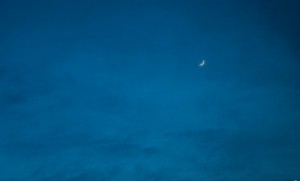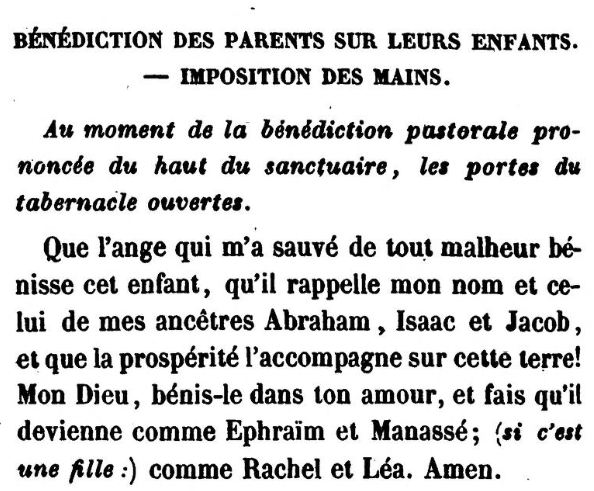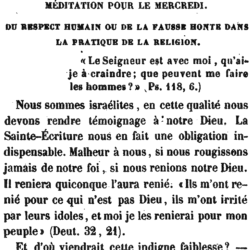| Source (French) | Translation (English) |
|---|---|
Au Renouvellement Du Mois. |
ראש חדש | At the New Moon |
Sur la Brièveté de la Vie. |
On the Brevity of Life |
“Enseigne-nous à compter nos jours, afin que la sagesse pénétre dans nos cœurs” (Ps. 90, 12). |
“Teach us to count our days, that wisdom may enter our hearts.” (Psalms 90:12) |
Seigneur Zébaoth, lorsque tu formas les deux grands luminaires, flambeaux du jour et de la nuit, ta souveraine sagesse voulut qu’ils fussent des signes visibles de la division des temps, pour nous apprendre à connaître rinstabilité de notre vie. Le lever et le coucher du soleil nous montrent la prompte succession des jours; le retour régulier de la lune nous indique la révolution rapide des mois et des années. Ainsi s’envolent les instants de notre existence fugitive, et nous arrivons bien vite au terme que ta Providence a fixé. Ce n’est que dans la conscience d’avoir été utiles, d’avoir noblement employé les heures de notre vie, que nous pouvons nous réjouir d’avoir vécu, et jeter un regard tranquille au delà du tombeau. |
YHVH (Adonai) Tsevaöt, when you formed the two great luminaries, flambeaux of day and night, your sovereign wisdom wanted them to be visible signs of the division of time, to teach us to know the uncertainty of our lives. The rising and setting of the sun shows us the swift succession of days; the regular return of the moon shows us the rapid revolution of months and years. Thus fly away the moments of our fleeting existence, and we arrive very quickly at the end which your Providence has fixed. It is only in the awareness of having been useful, of having nobly used the hours of our life, that we can rejoice in having lived, and look calmly beyond the tomb. |
Que voudrions-nous avoir fait à l’heure de la la mort? Faisons ce que nous voudrions avoir fait alors. Il n’y a point de temps à perdre; chaque moment peut-être le dernier de notre vie. Plus nous avons vécu, plus nous sommes près du tombeau. |
What would we want to have done [with our lives] at the hour of death? Let’s do what we [will] wish we’d have done. There is no time to lose; each moment may be the last of our lives. The more we have lived, the closer we are to the tomb. |
C’est pourquoi, Seigneur tout-puissant, Dieu d’Israël, je te supplie de m’accorder ta grâce et ta bénédiction dans ce nouveau mois qui com-mence; que par ta divine protection, il s’écoule pour moi et pour tous tes enfants dans la paix de l’àme, dans la pratique de ta loi, dans la piété et la charité; qu’aucune action, aucune pensée coupable ne trouble mon esprit ni mon cœur, et que le travail de mes mains suffise à la nourrie ture de mon corps. Que ton amour, ô notre Père, veille sans cesse sur nous. Amen. |
Therefore, YHVH (Adonai) Tsevaöt Elohei Yisrael, I beg you to grant me your grace and your blessing in this new month that is beginning; that through your divine protection, I and all your children may flow in peace of soul, in the practice of your law, in piety, and charity; that no act or guilty thought may disturb my spirit or my heart, and that the work of my hands may be enough to nourish my body. May your love, O our Parent, watch over us unceasingly. Amen. |
To the best of my ability, this is a faithful transcription of a teḥinah (supplicatory prayer) composed in parallel to the Prayer for the New Moon, following in the paraliturgical tradition of Yiddish tkhines, albeit written in French. (This particular paraliturgical prayer may be original or it may be based on an earlier work in German or Yiddish. Please contact us or comment below if you can identify it.) The prayer is included by Rabbi Arnaud Aron and Jonas Ennery in their opus, אמרי לב Prières d’un Coeur Israelite published in 1848 by the Société Consistoriale de Bons Livres. I have been aided by the DeepL translator in translating this prayer from French to English. –Aharon Varady
Source(s)


“Au Renouvellement Du Mois: Sur la Brièveté de la Vie | At the New Moon: On the Brevity of Life, by Rabbi Arnaud Aron & Jonas Ennery (1848)” is shared through the Open Siddur Project with a Creative Commons Attribution-ShareAlike 4.0 International copyleft license.









Leave a Reply